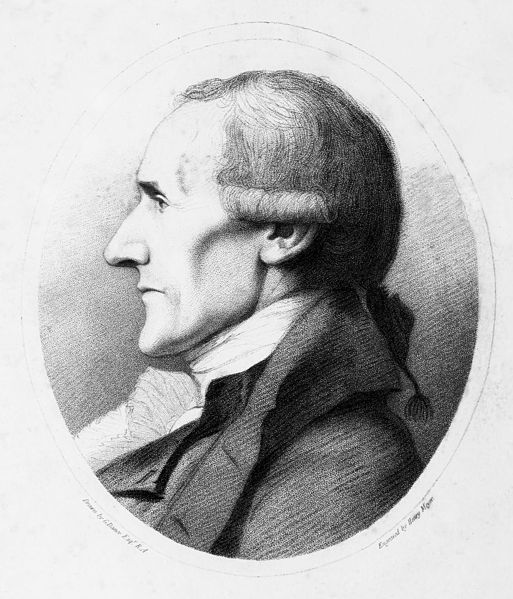This first post on prophets and influencers is on Granville Sharp. I am going to assume that not many people know who he is, but out of interest you could respond with a 👍 or 👎 below if you know, and haven’t used the internet or some other means to look him up.
First some background
Sharp was born in Durham in 1735 and was 1 of 14 (8 older brothers, only 5 survived beyond infancy, and 5 younger sisters). His Dad was Archdeacon of Northumberland and his grandfather, Archbishop of York. His education wasn’t to the same standard as his older brothers as money began to run short when it came time for him to attend school and though he went to Durham School (a boarding/day school) he was also home schooled. At 15 he became an apprentice linen draper in London, which he hated, but even at this young age, Sharp’s appetite for learning and his ability to argue well were already on full show. He taught himself Greek and Hebrew to aide in his conversations with two of his fellow apprentices. Sharp was also musical, he played six instruments, one of which he created himself and used to sign his name as G♯
Why is this Durham lad a prophet/influencer then?
Sharp was a follower of Jesus and sort to right social injustices he saw in society. in 1767 his brother, who was a surgeon, and ran a clinic every so often for poor people at his practice on Mincing Lane in London. One day, Granville was visiting his brother and met Jonathon Strong, a slave from Barbados who had been beaten by his owner using a pistol and left for dead. The brothers took him in, paid for his 4 month stay at Barts hospital and when he was well enough to leave found him some employment. A few years later, Jonathan Strong’s former owner saw him out and about and decided he wanted to make some money from his ‘property’. He had Strong captured and imprisoned and negotiated his sale to a slave owner in the Caribbean. Before Strong could be put on a ship he managed to get a message to Granville Sharp who immediately went to the Lord Mayor and the case was brought before him. Sharp managed to get Strong released and this was the beginning of Sharp’s life work.
From this moment, Sharp spent every moment reading English law in order to put an end to slavery and in 1769 he produced the first anti slavery tract in England entitled A representation of the injustice and dangerous tendency of tolerating slavery…’. This book became the foundation on which anti-slavery in Great Britain was fought and the legal argument set out was repeatedly used in court cases in order to free slaves in Britain. The court case that changed the course of history was that of the Somerset v Stewart case. The year was 1772 and James Somerset had run away from his slave owner a years earlier. He evaded capture for 56 days but eventually the slave hunters caught up with him and he was imprisoned on a ship bound for Jamaica to be sold to another slave owner. Again before the ship set sail, Somerset was rescued via legal appeals and the case brought before the highest Judge in the land Lord Mansfield. To cut a long story short Somerset was released with Lord Mansfield finding there was no law that allowed one person to own another in England. Although Mansfield was trying to only rule on this case alone and not set precedent the result was misrepresented around the world. Many believed if they could get to England they would free themselves from slavery and some tried. It also brought the argument that if you can’t be a slave in England you can’t be a slave anywhere. This case was the beginning of a sea change in the British attitude to slavery but it would be another 35 years until the Abolition act would pass into law.
Other notable information
- Involved in the Zong Massacre case in 1781.
- Never attended court during the Somerset’s case, sending others to represent Somerset in the hearings instead (he did this because he did not want to annoy Lord Mansfield due to the number of slave cases he had brought to him)
- Founding member and Chair of the Society for Effecting the Abolition of the Slave Trade. Sharp purposefully never arrived on time to the meetings so that he never had to chair the proceedings.
- Sharp didn’t always get things right and was involved in projects with the right heart that did not go as planned.
- As Sharp would do himself it is important to point to the others who worked alongside him in the abolition of slavery including the early Quakers who began the movement and other groups like the Sons of Africa.
Questions
Have you ever taught yourself a new skill? Play an instrument, ride a bike, learn a language.
If you could learn one thing without doing any work, what would it be and why?
How has your faith inspired you to fight particular battles or change the way you live?
Do faith groups have a part to play in informing people of the issues in the world and fighting these injustices?
What issue do you want to go away and seek to understand better in order to do something about it?
Image from G. Dance [Public domain]
Has been a part of BeachcomberFX since his arrival in the North East in 2014. He is well travelled (at least in the UK) having lived in Manchester, Nottingham, Derbyshire, Southport, Doncaster, Berwick and Edinburgh. Supporter of Newcastle United, will watch any sport.
